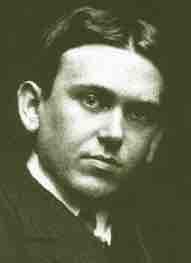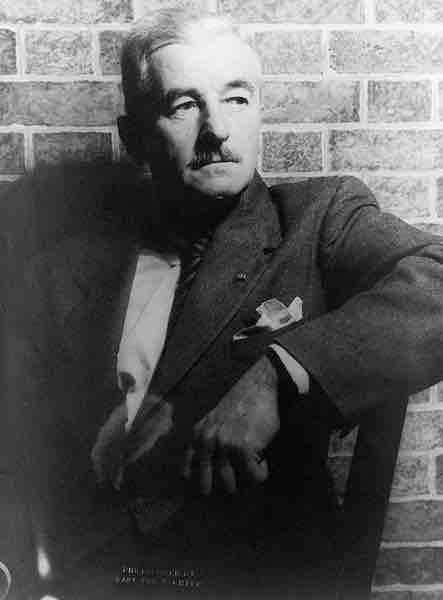The Southern Renaissance was a movement that reinvigorated American Southern literature in the 1920s and 1930s. The writers of the movement broke from common Southern cultural literary themes, notably the regrettable fall of the Confederacy, to address more personal and modernized viewpoints including opposition to industrialization and the South’s abiding racism. The Southern Renaissance included famed writers such as William Faulkner, Tennessee Williams and Robert Penn Warren. Perhaps ironically, however, this movement that explored racial questions and themes seemed to exclude African-American writers of the time.
Origins and Themes
In the 1920s, the satirist H.L. Mencken led the attack on the genteel tradition in American literature, ridiculing the provincialism of American intellectual life. In his 1920 essay, "The Sahara of the Bozart," a pun on a Southern pronunciation of "beaux-arts," he singled out the South as the most provincial and intellectually barren region of the U.S., claiming that since the Civil War, intellectual and cultural life there had gone into terminal decline. This created a storm of protest from within conservative circles in the South. Many emerging Southern writers, however, were already highly critical of contemporary life in the South were emboldened by Mencken's essay. In response to the attacks of Mencken and his imitators, Southern writers were provoked to a reassertion of Southern uniqueness and a deeper exploration of the theme of Southern identity.

Henry Louis Mencken
H.L. Mencken was an influential American writer and social critic who unwittingly helped to launch the Southern Renaissance literary movement.
The Fugitives
The start of the Southern Renaissance is often traced back to the activities of "The Fugitives," a group of poets and critics based at Vanderbilt University in Nashville, Tennessee, just after the First World War. The group included John Crowe Ransom, Donald Davidson, Allen Tate, Robert Penn Warren, and others. Together they created the magazine, The Fugitive (1922–1925), so named because the editors announced they fled "from nothing faster than from the high-caste Brahmins of the Old South."
The emergence of the Southern Renaissance as a literary and cultural movement has also been seen as a consequence of the opening up of the predominantly rural South to outside influences due to the industrial expansion that took place in the region during and after World War I. Southern opposition to industrialization was expressed in the famous essay collection. I'll Take My Stand: The South and the Agrarian Tradition (1930), written by authors and critics from the Southern Renaissance who came to be known as Southern Agrarians.
Previously, Southern writers tended to focus on historical romances about the "Lost Cause" of the Confederate States of America, commonly known as the Confederacy. This writing glorified the heroism of the Confederate army and civilian population during the Civil War and the supposedly "idyllic culture" that existed in the Antebellum South. Southern Renaissance writers broke from this tradition by addressing three major themes in their works. The first was the burden of history in a place where many people still personally remembered slavery, Reconstruction, and a devastating military defeat. The second was the South's conservative culture, specifically addressing how an individual could exist without losing a sense of identity in a region where family, religion and community were more highly valued than one's personal and social life. The final theme was the South's troubling history with regards to racial issues.
Because of the chronological distance these writers had from the Civil War and slavery, they were able to bring objectivity to writings about the South. They also employed new, modernistic techniques such as stream-of-consciousness and complex narratives. Among the writers of the Southern Renaissance, William Faulkner is arguably the most influential and famous as the recipient of the Nobel Prize for Literature in 1949. Beyond Faulkner, playwright Tennessee Williams (Cat on a Hot Tin Roof, The Glass Menagerie), author Robert Penn Warren (All the King’s Men), and others including Caroline Gordon, Elizabeth Madox Roberts, Katherine Anne Porter, and Allen Tate were classified as Southern Renaissance writers.

William Faulkner, 1954
William Faulkner, author of the 1929 novel, The Sound and the Fury, was a leading voice in the Southern Renaissance movement.
Legacy
Many Southern writers of the 1940s, '50s and '60s were inspired by the writers of the Southern Renaissance, including authors Reynolds Price and Walker Percy, poet James Dickey, influential Southern Gothic movement members Flannery O'Connor and Carson McCullers, Pulitzer Prize and Presidential Medal of Freedom recipient Eudora Welty, and Harper Lee, who won the 1961 Pulitzer Prize for her novel, To Kill a Mockingbird, which is considered a classic of American literature.
African-American Exclusion
Considering that many writers of the Southern Renaissance explored the South’s history of racism and slavery, with an eye toward healing those wounds, none of the prominent African-American writers of the day were seen as part of this literary movement. While the Harlem Renaissance was considered a celebration and rebirth of African culture in America, there were African-American writers who hailed from the South who were not necessarily slotted into either of the "Renaissance" groups.
Some of the most outspoken criticisms against the idea of the lost cause of the Confederacy came from African-American, southern writers prior to World War I, including Charles W. Chestnutt, who penned the novels, The House Behind the Cedars in 1900 and The Marrow of Tradition the following year. Yet African-American writers were not considered part of the Southern literary tradition as defined by the white, primarily male authors who saw themselves as its creators and guardians. This is a rather glaring omission, considering the prominence of other notable African-American writers from the South such as Richard Wright, a Mississippi native and author of the renowned 1940 novel, Native Son.
Richard Wright
Native Son author Richard Wright was one of the notable African-American authors who has been arguably overlooked as part of the Southern literary tradition.